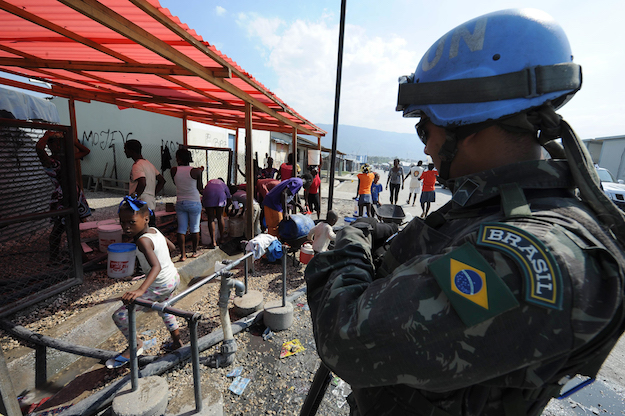With hopes for much-needed pension reform before this year’s presidential elections dashed, Brazil’s President Michel Temer opted for military intervention in Rio de Janeiro, a high-risk publicity stunt in a desperate bid to boost his low approval ratings. With the command of all security operations leaving civilian hands, the men in uniform suddenly wield enormous power – yet in a recent conversation, a high-ranking military officer told me that many in the armed forces are wary of being dragged into a quagmire.
However, when the topic of the conversation shifts to Brazil’s plans to send a battalion to join the United Nations’ Multidimensional Integrated Stabilization Mission in the Central African Republic (MINUSCA), this same officer voiced strong support. The same is true among many of Brazil’s most seasoned diplomats.
At first glance, that is nothing short of surprising.
The Central African Republic (CAR) is the world’s poorest country, and one of its most politically unstable and violent. Horrendous ethnic and sectarian violence since 2013, when former President Francois Bozize was overthrown, has in several instances brought it to the verge of genocide. The conflict between Muslim rebel groups from the north of the country, called Séléka (“Alliance”), an anti-Séléka peasant movement, Christian militias called anti-Balaka (“anti-machete”) and at least five other armed groups is fiendishly complex, and blue helmets have struggled to reduce violence even in their immediate surroundings. In the last year year, fourteen UN peacekeepers have been killed amid growing public hostility.
Why, then, is Brazil likely to join MINUSCA (pending approval of Brazil’s Congress), particularly considering that Brazil has no economic interests in the country, and does not even yet possess an embassy in Bangui, the Central African Republic’s beleaguered capital?
Despite the risks, a more careful analysis shows that Brazil’s decision to send approximately 750 soldiers to Central Africa is one of the Temer administration’s more far-sighted foreign policy decisions. There are two reasons why Brasília’s decision to engage in the Central African Republic makes sense.
First, international peacekeeping is today rightly seen as a key tool to reduce human suffering and stabilize regions that would otherwise see massive refugee outflows, increasing pressure on recipient societies across the world, particularly in other poor developing countries. Many rich countries are reluctant to send troops to dangerous and little-known operations such as MINUSCA. To make matters worse, the United States, which historically paid for almost one third of the $7.3 billion annual UN peacekeeping budget, has decided to make cuts of more than half a billion, dramatically limiting global peacekeeping capacities, a scarce global public good. In this context, Brazil’s decision to continue its peacekeeping engagement in the midst of an uncertain economic context matters greatly. Not only do Brazilian troops possess better equipment than many other developing countries that send peacekeepers to conflict regions, they would also help reduce a widespread perception among the local population that the UN force in the CAR is pro-Muslim (the top three contributing countries to MINUSCA are Bangladesh, Egypt and Pakistan), which has reduced the mission’s capacity to establish a dialogue with the Christian militias. Most importantly, however, 13 years of experience leading peacekeeping efforts in Haiti have allowed Brazilian peacekeepers to develop expertise that is likely to make them more effective in Central Africa. In a world shaped by the ‘G-Zero’ dynamic – where too few countries are willing to take on international responsibility – Brazil’s contribution in such a sensitive area will be widely recognized, strengthening its voice in multilateral forums.
Secondly, diplomats familiar with the situation on the ground readily admit that Brazil’s troops are likely to face challenges far more complex than those seen in Haiti or in Lebanon, where Brazil currently has around 200 troops and regularly deploys a warship to the maritime taskforce of UNIFIL, the UN Interim Force in Lebanon. Deploying troops in a landlocked country lacking even basic transport infrastructure is a significant logistical challenge. The geographic distance between conflicts within the Central African Republic is greater, and the intensity of military action is fierce compared to the sporadic outbreaks of violence experienced so far by Brazilian troops elsewhere. As a consequence, Brazil’s Air Force is expected to engage in combat there for the first time since World War II, using Embraer’s Super Tucanos and Black Hawk helicopters. In a world were great power politics seems to be back in full force, gaining relevant international military experience – which will inevitably involve more investment in modernizing the armed forces – seems like a sensible choice, even when Brazil faces few immediate geopolitical threats at this stage.
If Brazil’s Congress approves the mission in March, troops could be deployed as soon as April. The government will struggle to convey these issues to a public angry about persistent corruption and insecurity at home. When former President Luiz Inácio Lula da Silva decided that Brazil would lead MINUSTAH, the UN peacekeeping mission in Haiti, the slogan “Haiti is here” symbolized the incomprehension of many who wondered why Brazil sent troops to a faraway country if the government could not even provide basic security to its own citizens. Considering that the mission in the Central African Republic will almost inevitably involve more Brazilian casualties than in Haiti, the domestic debate in Brazil is likely to be far more heated.









